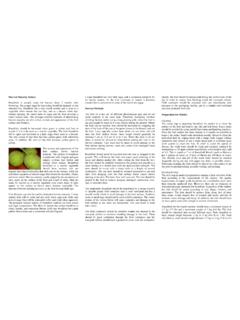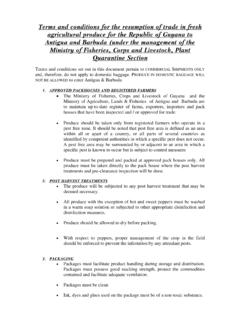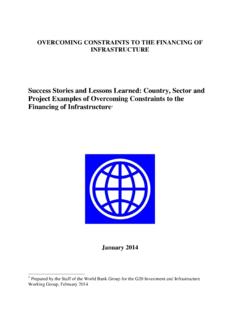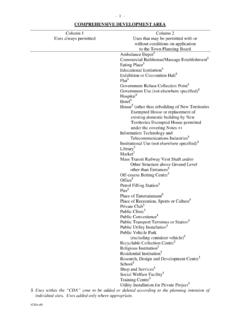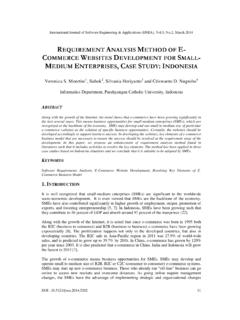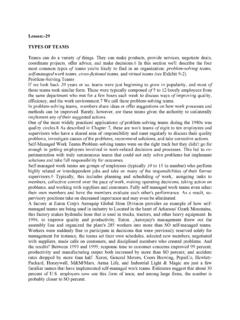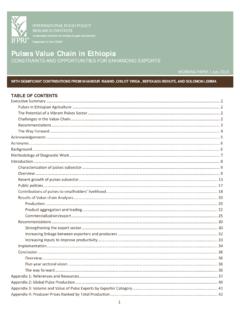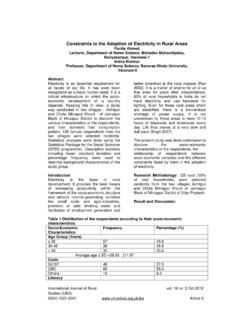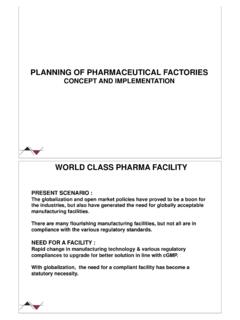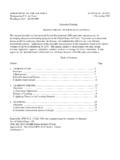Transcription of Market and Rural Enterprise Development Manual …
1 COOPERATIVE REPUBLIC OF GUYANA MINISTRY OF AGRICULTURE INTERNATIONAL FUND FOR AGRICULTURAL Development December 2009 Rural Enterprise AND AGRICULTURAL Development (READ) PROJECT SERVICE PROVIDERS AND STAKEHOLDERS TRAINING Manual ASDU, Ministry of Agriculture Market AND Rural Enterprise Development & ORGANISATIONAL STRENGTHENING & HUMAN AND SOCIAL CAPACITY BUILDING RE G E N T ST R E E T & VL I S S E N G E N RO A D, GE O R G E T O W N READ SERVICE PROVIDERS & STAKEHOLDERS TRAINING Manual Page 2 TABLE OF CONTENTS A. INTRODUCTION .. 4 B. Market & Rural Enterprise Development .. 6 1. Rural Enterprise Development .. 6 Concept of Micro Enterprise .. 6 Defining Business .. 6 Defining Micro- Enterprise .. 6 The Role of Micro- Enterprise in Rural Development .. 7 Causes of success or failure of a micro- Enterprise .
2 8 Business cycle and aspects .. 8 External and Internal Factors Affecting the Success or Failure of a Micro- Enterprise .. 8 Characteristics of micro- Enterprise .. 9 Roots, Indications and Consequences of Farmers Low Status in Rural Communities .. 10 The Business Cycle .. 11 Common Weaknesses and Constraints of Micro-entrepreneurs .. 11 Type of Project Assistance for Micro-entrepreneurs .. 13 Cases .. 14 Cabbage Farmer .. 14 Vilma s Processing Project .. 15 Chris Grocery Shop .. 18 2. Rural /MICRO- Enterprise MANAGEMENT .. 20 Management areas, skills and tools .. 20 Introduction of Financial Records .. 21 Preparation and Reading of Financial Records .. 22 Systematic Financial Analysis and 23 Options for the Entrepreneur .. 24 Income and Expenditure Record.
3 25 Important Lessons in Preparing Income Statements .. 25 Income Statement .. 25 3. DEVELOPING A BUSINESS PLAN .. 26 What is a Business Plan? .. 26 Why Write a Business Plan: .. 26 The Planning Process .. 27 Parts of the Business 27 4. MARKETING ESSENTIALS .. 29 Exporting Quality Agriculture Produce .. 29 Shipment Parameters .. 29 Pre-Sale Research .. 30 Determining the Conditions of a Sale .. 30 Determining the Terms and Details of Transport .. 31 Selecting a Freight Forwarder .. 32 Method of Payment .. 33 Explanation of letter of credit (L/C) .. 33 Ocean Transportation Arrangements .. 34 Packaging and Loading for Export .. 35 READ SERVICE PROVIDERS & STAKEHOLDERS TRAINING Manual Page 3 Export Terms of Sale .. 36 Insurance .. 38 Payment Collection with a Letter of Credit.
4 38 Documents Required for Collection of Payment .. 39 Arriving at Destination .. 39 Dealing with a problem shipment .. 39 C. Organisational Strengthening & Human and Social Capacity Building .. 42 MODULE 1: Understanding rights .. 42 MODULE 2: Understanding responsibility .. 46 MODULE 3: Talking the Talk & Walking the Walk .. 49 MODULE 4: Leadership and Group Dynamics .. 51 MODULE 5: Communication .. 52 MODULE 6: Power, Trust and Authority .. 55 MODULE 7: Partnership/Networking .. 57 READ SERVICE PROVIDERS & STAKEHOLDERS TRAINING Manual Page 4 A. INTRODUCTION This Manual on Market and Rural Enterprise Development and Human and Social Capital Strengthening has been commissioned by Rural Enterprise and Agricultural Development (READ) Project, a joint initiative of the Government of Guyana and International Fund for Agricultural Development (IFAD).
5 The project is designed to improve the living conditions of poor Rural households, especially small-scale producers and vulnerable groups, increasing their human, social, and financial assets. This Manual as well as the workshop will be used to facilitate and form part of Component 1 Market and Rural Enterprise Development and Component 2- Organisational Strengthening and Human and Social Capacity Building of the Project. It is the first in a series of manuals to be utilized to strengthen the capacity of service providers and stakeholders identified under the project. The Market and Rural Enterprise Development aspect of this Manual consists of Micro Enterprise Development , Business Planning, Preparation of Financial Records and Exporting of quality non-traditional agriculture produce where information was utilized from FAO bulletins, internet and other manuals.
6 The Human and Social Capital Strengthening consists of seven modules, four of which are excerpts from existing manuals, to aid Development of group dynamics, cohesiveness, problem-solving skills and encourage collaboration and creativity. Each exercise can be used effectively by itself. These activities generally begin with an introduction by the facilitator who sets the tone for problems or challenges to be solved by the group. Some are physical and active while others are brain teasers. The exercise should be fun while providing experience of working as a team. This Manual will be used by service providers and stakeholders to assist in providing training to Rural producers and views reflected do not represent those of IFAD. READ SERVICE PROVIDERS & STAKEHOLDERS TRAINING Manual Page 5 SECTION 1 Market AND Rural Enterprise Development READ SERVICE PROVIDERS & STAKEHOLDERS TRAINING Manual Page 6 B.
7 Market & Rural Enterprise Development 1. Rural Enterprise Development Concept of Micro Enterprise Micro Enterprise projects are aim at improving the status of persons through income generating activities and social Development activities. Income generating activities therefore are not an end in itself, but a means to achieve the overall goal of improved status of persons lives. This implies that the project supports those income generating activities which contribute the most to improving households or micro-enterprises. Defining Business A business is "any venture which involves production of goods and/or services to obtain profit." Four types of business in Rural areas are: a. Production: producing goods for selling, growing fruits and vegetables, sheep rearing b. Processing/manufacturing: converting raw materials into finished product, processing fruits into jams c.
8 Trading: buying and selling of the same product(s), grocery shop, Market stall d. Services: Main line of business is providing a service barber shop, transportation. Defining Micro- Enterprise Microenterprises can be considered as street vendors, carpenters, machine shop operators, seamstresses and peasant farmers. Micro entrepreneurs come in all types and their businesses in many sizes. This diverse group requires a variety of support for growth and improvement. Many of these men and women and their employees are poor and have limited access to services but they do not lack potential. Microenterprises contribute significantly to economic growth, social stability and equity. The sector is one of the most important vehicles through which low-income persons can escape poverty. With limited skills and education to compete for formal sector jobs, these men and women find economic opportunities in microenterprise as business owners and employees.
9 READ SERVICE PROVIDERS & STAKEHOLDERS TRAINING Manual Page 7 Although capital requirements of a micro- Enterprise may be low, to the poor it is considered high. Therefore, the risk of undertaking micro- Enterprise is not low. For the poor it is very hard to recover from failure of the micro- Enterprise . The main differences between micro-enterprises and other enterprises are: - Level of capitalization - Number of people involved - Ownership: for micro-enterprises the owner is likewise the manager and worker The Role of Micro- Enterprise in Rural Development The main role of Micro Enterprise Development is "Improving the Socio-economic Status of households through Income generating and Social Development Activities". By encouraging farmers to engage in micro- Enterprise , we encourage initiative, risk taking, decision making and income earning.
10 They are able to participate in socio-economic activities in their communities. Limited technical, literacy and business skills are other major reasons for low status of Rural farmers. Micro-enterprises undertaking requires relatively simple technology and management. When they are engaged in micro- Enterprise they can gradually improve their skills. In the case of women, they have a high burden and sometimes many children. Micro-enterprises usually are household based and women can choose an Enterprise which they can combine with their other chores. Employment in other enterprises would not contribute as much to improving women's status, because women would be employees rather than managers. Except for technical skills and earning their own income, women are not provided with the opportunity to exercise initiatives and are not generally or personally accountable for the over-all success of the business.
